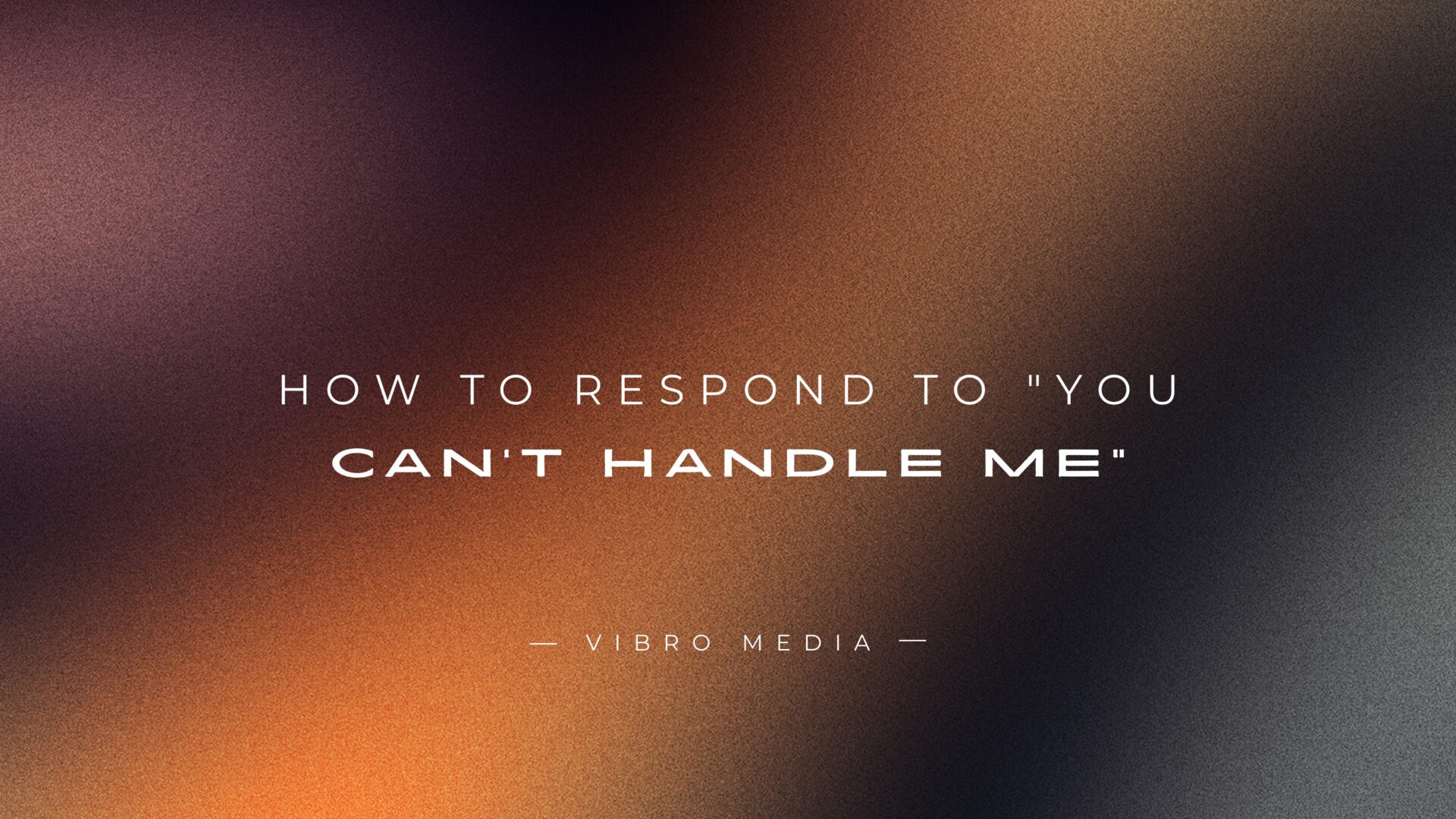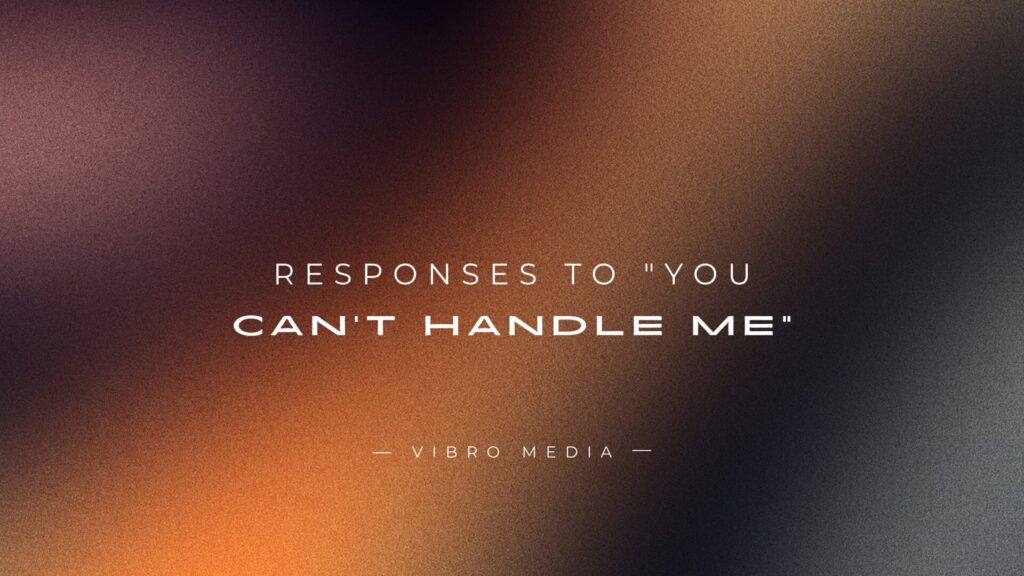How to Respond to “You Can’t Handle Me” : 200+ Responses

Ever had someone say, “You can’t handle me”? It’s a phrase that can catch you off guard, leaving you wondering what it means and how you should respond. This statement often carries more weight than words, hinting at deeper emotional undercurrents or power dynamics in your relationship with that person. It is crucial to understand how to navigate this tricky situation, whether it’s a friend, partner, or even a colleague throwing this phrase at you.
In this article, we’ll dive deep into the meaning behind “You can’t handle me,” explore the psychological implications, and provide practical advice on how to respond to maintain your confidence and composure. By the end, you’ll be well-equipped to handle this phrase gracefully, whether personally or professionally.
Understanding the Phrase “You Can’t Handle Me”
- What Does It Mean?
When someone says, “You can’t handle me,” they usually imply that they possess certain qualities, behaviors, or complexities that they believe you’re not equipped to handle. It’s often a way to assert dominance or to create a barrier between themselves and you. The phrase can be an invitation to step up, a challenge to prove your worth, or a defense mechanism to avoid a deeper connection.
- Psychological Implications Behind the Statement
This phrase often reflects more about the person saying it than it does about you. It might be rooted in their fear of vulnerability, a need to feel in control, or an attempt to protect themselves from potential rejection. Understanding these underlying motivations can help you respond more thoughtfully rather than taking the statement at face value.
- Common Scenarios Where This Phrase is Used
In Romantic Relationships: A partner might say this during an argument or when they feel misunderstood.
In Friendships, it could arise when a friend feels like you don’t agree with them on something important.
In Professional Settings: Though less common, this phrase can pop up in high-pressure situations involving egos.

200+ Responses to “You Can’t Handle Me”
Playful Responses
- I can handle you with one hand tied behind my back.
- Bring it on! I’ve been training for this moment.
- You’re underestimating my skills!
- Is that a dare? Because I love dares.
- You might just be surprised.
- Let’s see if you can help me handle you!
- Game on!
- I’ve handled worse… like Mondays.
- That sounds like a challenge—and I never back down from a challenge.
- If I can handle my morning coffee, I can handle you.
Flirtatious Responses
- I love a good challenge; let’s see where this goes.
- You’re just making me want to try even harder.
- Maybe we’re both a bit too much to handle.
- Handling you could be fun.
- Why don’t you let me find out for myself?
- I bet I can surprise you.
- Who said I wanted to handle you? I may want to enjoy the ride.
- You might be exactly what I’m looking for.
- Why don’t we see if we can handle each other?
- Challenge accepted—with pleasure.
Confident Responses
- I can handle more than you think.
- Trust me, I’ve got this under control.
- I’ve been through worse—bring it on.
- You’re not as tough as you think.
- I’m more than ready for whatever you throw at me.
- Handling you is just the warm-up.
- You haven’t seen anything yet.
- I’m built for this.
- You’re in good hands.
- I’ve handled things you wouldn’t believe—I can handle you, too.
Humorous Responses
- Handle you? I can barely handle my laundry!
- I’m pretty sure I can handle you… but if not, I’ll call in reinforcements.
- Are they handling you? Is there an instruction manual?
- Do I need protective gear for this?
- If I can handle rush hour traffic, I can handle you.
- Is this a full-time job or just a side gig?
- Handling you sounds like a workout—I should stretch first.
- Can I put you on my resume under ‘special skills’?
- I’ll give it a shot, but no promises!
- Do I at least get a medal if I succeed?
Skeptical Responses
- Why do you think that?
- Are you that difficult?
- What makes you so sure?
- Is that a warning or just your opinion?
- Do you think you’re that much of a challenge?
- Is this your way of testing people?
- What exactly do you think I can’t handle?
- You seem confident—care to elaborate?
- Is this something I should be worried about?
- Why don’t you let me be the judge of that?
Dismissive Responses
- I’m not interested in handling you.
- If that’s what you think, then maybe it’s not worth the effort.
- I don’t have time for games.
- If you’re that much of a handful, I’ll pass.
- I’m not here for drama.
- Handling you isn’t on my to-do list.
- I’m not about to waste my time.
- That’s your opinion.
- If you say so.
- I’m not looking to handle anyone right now.
Sarcastic Responses
- Oh no, I’m quaking in my boots.
- Wow, you must be terrifying.
- Yeah, you seem like such a handful.
- Oh, because you’re so difficult to deal with.
- I guess I’ll have to call in the experts then.
- Wow, should I be taking notes on how not to handle you?
- Right, because you’re just that special.
- I guess I’ll just cry in a corner now.
- How will I ever survive?
- Thanks for the warning; I’ll keep that in mind.
Curious Responses
- What makes you think that?
- Why do you say that?
- Is there a reason you feel that way?
- What’s your story?
- Care to explain?
- What do you mean by that?
- Has anyone ever tried?
- Is that something you’ve heard before?
- What exactly do you think I can’t handle?
- Why do you think you’re unhandleable?
Reassuring Responses
- Don’t worry, I’ve got this.
- I’m confident we’ll get through it.
- You don’t need to worry; I can handle it.
- Trust me, you’re in good hands.
- We’ll figure it out together.
- You’re not as unmanageable as you think.
- I’m here for you, no matter what.
- I’m more capable than you realize.
- You can relax—I’m not going anywhere.
- We’ll handle it one step at a time; there’s no rush.
Challenging Responses
- Try me and find out.
- Let’s see if you’re right.
- I’m ready whenever you are.
- Don’t underestimate me.
- You might be in for a surprise.
- I love a good challenge—bring it.
- I think you’re the one who’s not ready.
- Why don’t you let me be the judge of that?
- Let’s put that theory to the test.
- Careful of what you wish for.
Polite Responses
- I’ll do my best.
- Let’s see how things go.
- I’m up for it if you are.
- I appreciate the heads-up.
- Let’s take it one step at a time.
- I’m willing to give it a try.
- Thank you for the challenge; I’ll handle it as best.
- I’m here to work with you, not against you.
- I’ll approach it with care.
- We’ll figure it out together.
Deflective Responses
- Why don’t we focus on something else for now?
- Let’s not get ahead of ourselves.
- We have other priorities right now.
- Let’s cross that bridge when we get to it.
- I’m more interested in what’s in front of us.
- There’s no rush to figure that out.
- Let’s keep things simple.
- How about we deal with what’s on our plate first?
- Let’s take it one day at a time.
- I’m sure we’ll figure out the best approach when the time comes.
Encouraging Responses
- We’ve got this, no worries.
- We can handle anything together.
- You’re stronger than you think, and so am I.
- Let’s take it one step at a time—we’ll figure it out.
- You’re not alone; I’m here with you.
- We’ve overcome bigger challenges before.
- You’ve got this, and I’ve got your back.
- Handling you sounds like an exciting adventure.
- Together, we can handle anything.
- Don’t doubt yourself—we’re capable of more than we realize.
Philosophical Responses
- What does it truly mean to handle someone?
- Maybe we’re not meant to be handled but understood.
- Is handling even the right approach, or should we just coexist?
- Perhaps it’s more about balance than control.
- Is anyone capable of handling another person?
- Sometimes, the journey of handling is more important than the destination.
- Handling suggests control—maybe we should focus on harmony.
- Can anyone truly handle the complexity of another human being?
- Maybe it’s not about handling but about learning from each other.
- Perhaps handling isn’t the goal—understanding is.
Self-Reflective Responses
- Maybe you’re right, but I’m willing to grow.
- I’ve handled a lot, but I’m still learning every day.
- Handling you might be challenging, but I’m up for personal growth.
- I don’t know if I can, but I will try.
- If I can’t handle you now, I’ll work on becoming someone who can.
- Handling you will teach me something about myself.
- Perhaps handling isn’t the goal, but learning together is.
- I’m not perfect, but I’m always striving to be better.
- Handling you might push my limits, but that’s how we grow.
- If I fall short, I’ll learn and improve—handling you is just part of the journey.
Empathetic Responses
- I understand you might feel that way, but I support you.
- Is there something specific that’s making you feel this way?
- I’m here to listen if you want to talk about it.
- It sounds like you’re feeling overwhelmed. How can I help?
- You might feel difficult, but I want to work through it with you.
- It’s okay to feel this way; let’s work together to make things easier.
- I’m here for you and want to understand your origins.
- Your feelings are valid, and I’m here to support you however possible.
- Let’s figure out what’s happening together—I’m not going anywhere.
- I can see why you might think that, but I’m committed to working through this with you.
Provocative Responses
- Maybe you’re right, but what if I surprise you?
- Do you want to test me? It might not end how you expect.
- Isn’t it more interesting to find out if I can handle you?
- What makes you think I’m afraid of a challenge?
- How about we put that theory to the test?
- Maybe you’re underestimating what I’m capable of.
- Do you think you’re that much of a challenge?
- Be careful; you might end up being impressed.
- Why don’t we see how well you handle me instead?
- Are you ready for what happens if you’re wrong?
Dismissive/Indifferent Responses
- If you say so.
- I’m not concerned about it.
- It’s not a big deal to me.
- If you think that’s the case, fine.
- I’m not going to worry about it.
- Not my problem.
- If you believe that, then that’s your perspective.
- I don’t have the energy for this right now.
- I’m not interested in proving anything.
- That’s your opinion, and it doesn’t affect me.
Vulnerable Responses
- I’m unsure if I can handle this, but I will try.
- I’m a bit overwhelmed, but I want to try my best.
- I’m worried you might be right, but I hope we can work through it.
- I’m struggling with this, but am open to learning and growing.
- I don’t know if I’m ready for this challenge, but I’m willing to face it.
- I’m unsure about handling this, but I’m committed to making it work.
- I’m feeling vulnerable right now, and I’m not sure how to handle this.
- I want to handle this, but I’m afraid of falling short.
- It’s hard to admit, but I can handle everything.
- I’m trying my best, but I’m scared I might not be enough.
Mystical or Metaphorical Responses
- Handling you is like trying to catch the wind—elusive but fascinating.
- You’re like a complex melody that takes time to understand and appreciate.
- Handling you might be like navigating a labyrinth—challenging but rewarding.
- Maybe you’re a storm—powerful and untamed but also mesmerizing.
- You’re like a dance in the moonlight—difficult to master but enchanting.
- Handling you might be like trying to hold onto a rainbow—beautiful but elusive.
- Perhaps you’re a puzzle with pieces that fit together in unexpected ways.
- Dealing with you could be like tending a wild garden—demanding but full of growth.
- You’re like a deep ocean—vast and mysterious, with treasures waiting to be discovered.
- Handling you could be like chasing shooting stars—challenging but magical.
Emotional Reactions to “You Can’t Handle Me”
- The Initial Shock and Confusion
Hearing “You can’t handle me” can be jarring. It’s natural to feel taken aback, especially if the phrase comes out of the blue. The initial shock can stir up emotions ranging from confusion to frustration.
- Navigating Feelings of Inadequacy
The phrase might trigger feelings of inadequacy or self-doubt. You might start questioning whether you’re truly capable of dealing with the situation at hand. It’s important to recognize these feelings but not to let them control your response.
- Overcoming Defensive Reactions
Your first instinct might be to go on the defensive to prove you can handle them. However, reacting defensively often escalates the situation. Instead, take a moment to breathe and collect your thoughts before responding.
The Power Dynamics in Play
- Why People Use This Phrase: A Power Move?
In many cases, “You can’t handle me” is a power move. The person saying it might be trying to establish dominance or to put you in a position where you feel you have something to prove. Recognizing this can help you avoid falling into the trap of engaging in a power struggle.
- Understanding the Subtext: Control vs. Vulnerability
The phrase might also be masking a deeper vulnerability. The person saying it could be trying to protect themselves from getting hurt by pushing you away. By understanding this subtext, you can approach the situation with more empathy.
- How Power Dynamics Influence Relationships
Power dynamics are at play in all relationships, whether personal or professional. Awareness of these dynamics helps you navigate conversations without losing footing or compromising your values.
How to Respond in a Romantic Context
When a romantic partner says, “You can’t handle me,” it’s crucial to approach the situation carefully. This is often a cry for deeper understanding or a signal that they feel misunderstood.
- Understanding Your Partner’s Perspective
Try to see things from their perspective. Are they feeling overwhelmed, neglected, or insecure? Showing that you’re willing to understand them can defuse the tension and open a more honest conversation.
- Staying Calm and Collected
Remaining calm is key. Responding with anger or frustration will only escalate the situation. Instead, calmly express your willingness to listen and work through whatever challenges are being presented.
How to Respond to Friendships
This phrase might indicate a deeper issue in friendships that has yet to be addressed. It could be a sign that your friend feels unsupported or that there’s a misunderstanding between you.
- Balancing Empathy and Assertiveness
It’s important to show empathy while being assertive about your feelings. Let your friend know you care, but also clarify that you want to resolve any issues together rather than letting them fester.
- When to Set Boundaries
If a friend repeatedly uses this phrase to manipulate or control the friendship, it may be time to set some boundaries. Healthy friendships are built on mutual respect, not power plays.
How to Respond in Professional Settings
The phrase “You can’t handle me” might surface in a professional environment during high-stress situations or conflicts. It is crucial to handle this with professionalism.
- Maintaining Professionalism
Responding professionally means controlling your emotions and addressing the issue directly without getting personal. Focus on the work and how to move forward rather than getting drawn into personal conflicts.
- Turning the Conversation Constructive
You can turn the conversation around by asking the person’s specific concerns and how you can address them together. This shifts the focus from confrontation to collaboration.
The Importance of Self-Confidence
- Building Self-Assurance in the Face of Challenges
Self-confidence is your best defense against phrases like “You can’t handle me.” When you believe in your abilities, you’re less likely to be shaken by someone else’s words.
- How Self-Confidence Affects Your Responses
A confident response is calm, measured, and focused on resolving the situation rather than proving a point. Confidence allows you to stand your ground without becoming defensive.
- Practical Tips for Boosting Self-Confidence
Positive Affirmations: Regularly remind yourself of your strengths.
Preparation: In professional settings, being well-prepared can boost your confidence.
Self-Care: Taking care of your mental and physical health reinforces your overall sense of well-being.
Communication Strategies to Defuse the Situation
- Active Listening: The First Step to Understanding
Before you respond, listen—listen. Active listening involves hearing the words and understanding the emotions behind them, which can provide valuable insight into how to proceed.
- Using “I” Statements to Express Your Feelings
When you do respond, use “I” statements to keep the conversation focused on your feelings and perceptions rather than accusing or blaming the other person. For example, “I feel like we’re not understanding each other” is more constructive than “You’re not making any sense.”
- Asking Clarifying Questions to Gain Insight
Don’t be afraid to ask questions. Clarifying what the other person means can prevent misunderstandings and help you respond more effectively. Questions like, “Can you help me understand what you mean by that?” can be very helpful.
Turning the Situation Around
- How to Reframe the Conversation
Reframing the conversation means shifting it from a confrontation to a collaboration. Instead of focusing on the conflict, steer the discussion towards finding a solution together.
- Finding Common Ground
Look for areas where you both agree. Finding common ground can help build a bridge between your perspectives and make it easier to resolve the conflict.
- When to Walk Away: Recognizing Toxicity
Sometimes, the best response is no response. If the person is toxic and unwilling to engage in a constructive conversation, it might be best to walk away. Your mental and emotional well-being should always come first.
Personal Growth Through Challenging Conversations
- What You Can Learn About Yourself
Handling difficult conversations, like one involving the phrase “You can’t handle me,” can teach you a lot about yourself—your triggers, strengths, and areas for growth.
- How These Interactions Can Strengthen Your Character
Each challenging interaction is an opportunity to build character. By staying calm, confident, and constructive, you can better handle the situation and grow stronger.
- The Long-Term Benefits of Handling Conflict Well
Successfully navigating these conversations can strengthen personal and professional relationships and build your reputation as someone who can handle tough situations with grace and poise.
Conclusion
In conclusion, handling a statement like “You can’t handle me” can be challenging, but with the right approach, you can turn it into an opportunity for growth and understanding. Whether you respond with humor, confidence, or genuine curiosity, the key is to stay true to yourself and maintain your composure. Remember, your response can set the tone for future interactions and reveal your strength and character. If you’re also navigating comments like “You’re too good for me,” you might
find additional insights and strategies in our guide,
How to Handle “You’re Too Good For Me”: 200+ Ways.
FAQs
Q. What does “You Can’t Handle Me” really mean?
It typically means the person believes they are too complex, intense, or challenging for you to deal with, often used as a power move or a defense mechanism.
Q. How should I react if someone says, “You can’t handle me”?
Stay calm, listen actively, and respond with confidence. Try to understand the underlying emotions behind the statement and address them constructively.
Q. Is it ever okay to walk away from a conversation like this?
If the conversation becomes toxic or the person is unwilling to engage in constructive dialogue, it’s okay to walk away for your well-being.
Q. Can responding to this phrase improve my relationships?
Absolutely. Handling such conversations with empathy and assertiveness can strengthen your relationships by fostering better understanding and respect.
Q. How can I prepare myself for challenging conversations?
Boost your self-confidence, practice active listening, and be prepared to use “I” statements and clarifying questions to navigate tough situations effectively.






